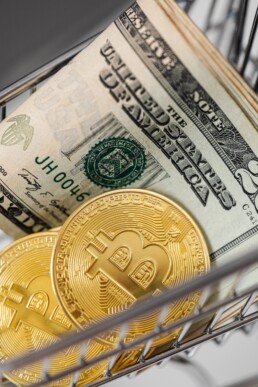Growth vs Value Investing
In the article “what is a stock”, we mentioned growth stocks and value stocks. This differentiation applies to two different approaches to allocate money in the market, even creating two competing schools of thought.
When we talk about growth, we are defining a quick, fast, nervous growth approach, popular in today's start-ups such as Uber, Tesla, and all the other New Economy companies.
The value approach, in contrast, is based on slow steady growth. More on a kind of Warren Buffet vision.
These two approaches, so different from each other, can obviously be divided into different strategies or be mixed in the average investor's portfolio. The important thing is to grow our capital.
We can define the investor's most suitable approach based on 3 characteristics:
1 the growth of the company underlying the stock.
In this case, our focus will be directed at the company's economic growth and returns. This is a Growth approach when these characteristics outperform other companies in the same market or beat the market itself. It is the obsessive search for the new Apple to revolutionize the industry.
Investors look for companies with a couple of years of rapid growth, and these companies will in most cases be smaller and younger and leaner than their competitors.
In contrast, Value investors are not interested in these mirabulous performances but aim for more mature and stable companies with slower growths.
2 Valuing the 'stock
To be a value investor is to be a bargain hunter, buying low for stocks of higher intrinsic value than the market now prices. In the mindset of the value investor, you don't buy stocks just because they are cheap but because there is a study and a search for value behind them.
Growth stocks tend to be much more expensive, but the 'investor will be pay this price because he expects exponential upside.
3 price volatility
growth stocks in most cases suffer from higher volatility than value stocks. This is because Growth stocks have a higher inherent risk given the fundamentals of start-up companies that are not yet established.
the growth approach is a riskier approach, although it may be the one that pays the most if you are buying a company that will have exponential growth over the years
growth stocks are usually sold and bought based on promises. Promises of growth, turnover, and market position. But promises are not always kept.
the value approach is more time-consuming and much more boring, with low volatility and little market excitement.
what is the best approach? depends on the period you are considering, how much risk you are willing to expose yourself to, and what kind of companies you are analyzing. A mix of the two methods might be the right choice, while a single growth approach in a specific sector that is growing is risky but in principle profitable. Hopefully.
What is a stock?
When we hear about financial markets and stock values on the news, we often pay attention only to the numbers and percentages, marveling at vigorous rises or destructive falls, but what do these numbers refer to when it comes to stocks?
What are stocks?
A stock, in finance, is a financial security representing a share in the ownership of a corporation. is a financial asset representing a percentage of ownership of a company.
So, as explained in the article on IPOs, companies sell their shares to recover funds. Kind of like what is done with bonds, but there are major differences. The only part in common is the need to drain funds for the company.
Since a stock indicates ownership of a piece of the company represented, the percentage you own depends on the number of those specific stocks you have in your portfolio.
the basic idea is quite simple
at the end of the year or at the close of the fiscal year, the money the company has made, after all expenses have been removed, is owned by the shareholders. These profits have to trickle down to the holders and have only two paths, dividends and capital growth
Assuming a profit of 10 million in the year just ended, the company may decide to split this figure in half. 5 million is distributed through dividends to shareholders while the other 5 million is reinvested into the company.
the company with this money can develop a new product or cheaper methods of production. this should lead to creating more profitability in the company and this has an effect on the price of the individual share, driving it up in price and allowing the small investor to sell it at a higher price.
Obviously as is easy to understand , having a preponderant amount of stock allows you to have a say in what the company does, being able to direct money management decisions. Shareholders must be happy.
Like any business sector, there are companies that are more or less solid and behave differently depending on the period. A health care company is different from one that makes cell phone apps.
Geographic location is also important, as a Western company will behave differently from one in a developing country.
Then there are two big definitions for stocks, namely growth stocks and value stocks
Growth stocks are stocks of young and small companies that have greater potential to grow in the future.
So-called value stocks are of established companies that have a history behind them and generally pay large dividends to shareholders.
Stock dividends are not to be considered the same as bond yields. In fact, dividends are a choice of the company to give money to its shareholders and not an obligation as in the case of bonds, an obligation that if not met leads to the default of the issuer.
IPO
If a company needs money, one way to avoid getting bogged down by going into debt, or further debt, is to become a Public Company or to going public offering shares of the company on the market.
These operations are called IPOs or initial public offering.
It is not exactly a very simple thing and indeed there are a lot of bureaucratic steps and tons of paperwork to fill out, however, for popular sentiment an IPO is a demonstration of business and also personal success on the part of the owner.
Let's go through an example on how to list on the U.S. market.
Step 1- Investment Banker
Investment Bankers are an individual or group of individuals, whom we can refer to for convenience as "early investors," who help the company informally raise initial capital. The goal is to recover as much capital as possible, with the banker doing all that follows to promote the IPO.
Step 2-documentation
A registration document with the SEC commission will then have to be drawn up.
this document will be devoted to all the details of the company's operation, to explain in detail the company's operations, management and its financing prior to the IPO transaction. An identity card will then have to be created for the financial authorities.
the SEC will obviously investigate to see whether there is true or false information in the document, only designed to defraud the public. The SEC must also understand whether the listing is feasible based on the financial stability of the Company, to protect investors.
If all goes well, a listing date is decided.
Step 3 - create a document for the public
the banker, after approval by the SEC, should create a document for the public with a description of the company, with its operations, current performance, and on projected future operations.
the document will be circulated into investment institutions and larger investors. This is just to begin to create interest
This does create the so-called indication of interest, to see how many stocks people are willing to buy and at what price
This is to make sure that the selling price of the stock is well calibrated when they are listed on the market, this also makes the allocation of the shares defined, that is, how many are sold
IPOs also suffer from the hype of the moment. Our company may be on the top level and be particularly fashionable, this will be reflected in its listing price. A big ask might be a problem for the average investor, and too high a price might not be a sensible purchase.
On the contrary, an IPO of a company that receives lukewarm or no feedback may also be postponed precisely because the forecast for market collection is really unsatisfactory.
IPOs, like any financial transaction, have inherent risks for the average investor. They need to be well researched and understood, especially if it makes sense to jump in at a moment of hype.
What is a currency?
Dollars, euros, pounds, marks, lire, sesterces and florins
Coins and their names have always been synonymous of wealth. But what is currency?
Today when we talk about currency, we think about the 10 dollars bill, but many of us think of ATM and credit cards. But currency is the fuel of every modern economy and is the unit of measure for the production of goods and services.
To understand the economic value of a good or service we use Currency as the unit of measure to make comparisons between different assets. We must then remember that broadly speaking when we have too much currency we suffer the phenomenon of 'inflation while when we have too little currency we suffer deflation. In theory.
It should be remembered that today's currency is issued by central banks against the transfer of collateral i.e. government bonds, so this currency is borrowed or rather created as loan, which generates debt.
Thousands of years ago, before the invention of currency, the 'economy was based on barter, which, however, was not an efficient system given the various things to be bartered. If I own 3 eggs and I need a cow for my farm, well barter becomes a system that makes at least one party interested in the exchange unhappy. The exchange becomes impossible and I will never get the cow I need. And the eggs rot.
Now given the impossibility of applying the system all exchanges, what we call "currency" was invented to solve every problem. With X number of coins I can go to my friend and get the cow I am interested in, so the same coins can be used by my friend to pay the worker to fix his farm that is falling apart.
Coins also, in 'antiquity but also until recently, had an intrinsic value determined by the value of gold and silver used for minting.
Coins, however, are a difficult commodity to carry around in large quantities; they can be stolen or lost. Buying a loaf of bread or a palace, requires a large difference in the quantity of coins. To overcome these problems, checks were born, which later turned into today's banknotes.
We have condensed the story as much as possible for ease of understanding.
Each banknote guaranteed the existence of its gold value at the issuer's depository.
in 1944, at the height of World War II, the monetary system was changed at Bretton Woods, and the only currency convertible into gold becomes the U.S. dollar with all other currencies pegged to it
in 1971 nixon abandoned gold convertibility for the dollar to avoid default because US was involved in the Vietnam War. On that day the fiat currency was born, or perhaps it would be better to say returned to the stage of history, whose value is given by trust in the 'authority that imposes its use, thus the government that issues it.
there are no more limits in the creation of money, being able to print as much currency as one wants and needs since the currency is created by the central bank of a country, in this case if we are talking about Europe , by the ECB.
In the history of our planet and of our civilization, kings, sovereigns and emperors had the ability to create the currency, and then this ability moved on to lordships and governments , and now end up with central banks that are private entities.
To date, the value of the currency is given by the international exchanges that take place between the various states, which implies considering the strength of the various economies as well.An increase in the value of a country's currency will make the purchase of its goods and services abroad, by a foreign citizen with lower value currency more difficult. The higher the value of the currency, the higher the price of goods that will be exported. One of the unfair activities you can do is to artificially keep the value of your currency low to increase exports by going to devalue it. And yes I am talking about you, China!
This is where Bitcoin comes in, which is a "currency" that we can describe as special. In fact, nothing like it has ever been created in the history of 'man, while the economic history books are full of fiat currency experiments that failed. Go look at what happened a few decades before the French Revolution....
In fact bitcoin possesses two characteristics that are unique compared to fiat currency, namely its decentralization and its deflationary nature.
No one controls the protocol nor can anyone change its characteristics by issuing more or less coin than those decided in the protocol. The protocol can be modified but all users must agree to the modification.
In the long run, the deflative nature of bitcoin makes it an excellent tool for long-term savings.
Psychology, money and divorce
I was talking some time ago with a psychologist friend about how she was working more and more with couples or individuals who were going through the end of their marriage or were close to divorce. In the end, I realized that the main reasons that lead people to divorce are basically three and they are all issues related to Sex, Money, and Family. All issues that are mixed into a gigantic problem that destroys even the most loving couples.
Now I fully understand my friend's words and the situations she described. I cannot talk about family problems because every family is made differently, but money is the same for everyone. So is our reproductive system.
Managing the family budget is something delicate. Two people, with two different spending predispositions, come together wanting to start a family. These same people will have to profitably manage the money they themselves bring home.
The point is all about "managing profitably."
A person may be more predisposed to saving or to squandering. Going from the extreme of saving every penny to the other extreme of spending it all to the point of being left with bank account in deep red at the end of the month.
The issue of having a couple formed by the two extremes in the long run goes to create enormous tensions. As always, virtue lies in the middle, but the propensity to save is an innate quality and a behavior taught by parents.
In addition to how to spend money on everyday things, then go the choices and discussions for the long-term expenses that are considered important, namely house, car, and investments.
Things like changing the car every 2 or 3 years, looking for a beach house or deciding where to take the darn vacations.
Money is often an issue in every family, especially if one or more children are also involved. Making ends meet is crucial, as is ensuring an adequate amount in the children's future. If you want them to be educated in the right private school, you will need to have the right amount in the account.
Saving something is always important; making your wife or husband happy is equally so. But economic problems and the anxieties produced by these, in times of economic slowdown, become more and more acute. Anxieties and problems that are always reflected in the behavior of he or she in the family who administers and makes ends meet.
Think about it for a moment, if you are very worried about your economic situation, this worry will follow you everywhere, even during your quality time with your partner. Time that will no longer become quality time until it becomes nonexistent.
And after some time your partner will go looking for this quality time somewhere else. And you will end up being the second tier partner and usually end up breaking up.
Have you seen that loop? Money problems that become sex problems that become family problems. Complete destruction.
Of course, the description is overly simplistic. One cannot describe in totality the issues in a relationship and the various facets that each of us has that change behavior within a couple, but in broad strokes this example is a good picture of what happens.
What to do to avoid this?
When you have economic anxieties and issues, talk to your partner about it. He or she needs to be aware of the problem and understand why you are behaving a certain way. It may not be the easiest choice, but at least he will know that he needs to start cutting unnecessary expenses.
Explaining economic mistakes and errors is bad. Our egos will always suffer but heck, reality is reality and if you want to solve problems you must first accept that they exist. Dealing with problems and stress together can prevent 'misunderstandings and destructive or self-destructive behavior.
Having an emergency fund, large enough for a few months of survival, is always a good thing, and those who do not have it always take a risk that I find exaggerated.
A little available liquidity always makes sense. Especially now.
FOMO
FOMOOOOOOOOOOOOOOOO
What does this word mean?
Today we're going to explain a term that you surely read often, but that also has a deep meaning in the psychology of every trader.
FOMO means fear of missing out, and we could translate it as fear of having missed an opportunity, sometimes unrepeatable.
We can also see it as a social anxiety for having missed an interesting and very profitable investment train.
Fomo is one of the many biases working against you.
This feeling that you will feel deep inside will be a mixture of discouragement, anger towards yourself and frenzy to jump on the market without ifs and buts, without thinking and without having any regard to money management.
It's a feeling that is present especially now in the social media era, thank to the continuous updating of what other people are doing, the lifestyle that the social media of certain characters are selling us and their wealth.
You see on twitter and instagram unknown kids becoming millionaires overnight, driving around Dubai sitting in bentleys and surrounded by fabulous models, all accompanied by articles and pictures of their bank accounts at various zeroes.
And you're in your bedroom, in your underwear, guzzling a cola. It's obvious that you want to do what they do and have their lifestyle.
However, this emotion of envy you're feeling leads you to follow some advice that could be bad for your wallet.
Right now you're susceptible to those articles in blogs with titles like "the 5 coins you can't not have in your portfolio" or "XX's untameable growth" or "expected 200% return with YY".
To which we have to add all the messages that you read in the various chats, which promote things never heard that in most cases are scams.
And then you enter in the optics that "now or never" on some unknown coin, you buy it exaggerating and you throw away all your past gains.
You don't have to do that, it's not a competition and you don't have to buy things that in a normal situation you would have never bought.
And on top of that you are left with the anger of having thrown money away and you can only take it out on yourself.
This is why we talk so often about managing emotions and anxiety.
If you had stopped to think, none of this would have happened or you would have allocated a much smaller amount.
You've gone overboard with your level of risk
Now let's face it, social media are fake.
They are a mirror of what we would like to be and that we somehow make others see. But that we are not.
When we see these millionaire kids, their success is exaggerated to sell you one of their products.
Most of the successes of those we follow on social are exaggerated narratives.
The cars, jewelry and private planes are definitely rentals and the incredible models are only friends of their cousin or prostitutes.
None of these champions talk about their mistakes and losses but all they talk about are the victories and the fantastic billions they are making. Some even get paid to foment fomo or to sell scams or useless courses or useless books.
Now back to us, generally the rule to earn is buy low and sell high, which is very logical but in most cases if a stock is low, mentally evaluate the situation as negative, if it is high it is positive and you think it will go up again.
This is possible, but what if the uptrend is over?
If everyone is rushing to buy Ethereum after a 200 percent rise, you are compromising your risk level just because you are following the crowd, you are following the hype.
And the hype is the enemy
You're acting on the urgency to do something and that's not good because as you know deep down, returns are not guaranteed.
The fomo, the frenzy doesn't make you think rationally and doesn't deepen what you're putting your money on.
If you get caught up in the frenzy to buy after you've seen a post on some social, stop for a moment and think
who is making the post on social networks? Is he a serious and reliable person, is he an idiot?
Is he someone who knows something about it or is he a bum with no experience at all?
These questions can stop you from making some careless purchases.
And always remember that limited time windows in most cases hide nasty surprises.
I don't doubt that some of the axles being touted could be the new Tesla, but being cautious is always best.
You might feel like an idiot for missing an opportunity or will you be an idiot for losing all your money?
Keep calm and study.
The rise in interest rates. Maybe.
Today we're going to talk about interest rates.
At this moment in history, interest rates are at their lowest, they have never been lower.
By logic, something that goes down has to come back up, so what would happen in theory if interest rates were to go up again?
Let's start putting the pieces in order.
Central banks of nation around the world have various tasks and one of them is to stabilize economic activity and promote the prosperity of their own nation within the global economic competition.
One of the central bank's weapons is the control of interest rates, rates at which major banks lend money to smaller banks in what is called the overnight market.
This money will then be lent to other economic entities such as companies and individuals like yourself, at higher rates of course.
This flow of money allows companies to finance themselves and grow, people to buy a house by accessing a mortgage and small banks to be remunerated for lending money. The money so switch on the 'economy, creating value and wealth.
In the U.S. for example, and in this case for their central bank the Fed, the interest rate that banks charge in these cases during overnight loans is called the Federal Funds Rate.
This is the rate you hear about when the media talk about rising rates on the various economic news programs.
As you can see these rates definitely have an impact on the companies and people around you.
These rates affect the lives of the people and they are the underlying of any loan from any bank.
They affect mortgages, lines of credit and even bonds.
They are an important metric to monitor and keep an eye on in an advanced economy such as the West.
In fact, in the 2008 economic crisis, the Fed lowered interest rates significantly to help the overall economy recover.
So lower rates for banks are reflected in lower rates for businesses and people.
Companies have lower costs for a certain period of time and allows to have more employees, who have a salary and then expenses, so they boost the economy.
As you can see is a phenomenon that we could call circular.
Now, logically, in the event of rising rates any person with any debt will spend more for their debt and in the case of a company we would have higher business expenses and necessary cuts to be made to possible staff.
Now, read in this way, it seems that the solution to all the ills of business is to keep rates at rock bottom levels, but it should be noted that central banks must try to keep the economy sustainable, avoiding to depress it with high rates or set it on fire with the printing of money.
A system overexcited by unlimited money printing and low rates creates problems in the long and medium term.
An economy with a strong growth momentum, we will see a large demand for goods and services from citizen users.
Since the production of goods and services cannot be increased overnight and more people employed means more money spent in the market, this will result in a price increase called inflation.
If we want to explain inflation in a simplistic way, it is as if the value of money decreases or even collapses, decreasing economic well-being and eroding household savings.
We actually experience some inflation every year as central banks try to have an inflation level of 2% per year.
Understand that 2% per year is bearable, a 100% per year or per month is destructive.
So, understanding this risk, by raising interest rates and making loans more expensive, they are trying to cool down the economy, trying to balance it as best they can and lower inflation
Obviously there are short-term costs, but better than having an inflation like the Venezuelan one.
In fact, in the event of a rate hike, the effects will be felt by investors and consumers alike.
Consumer debts will become more expensive, such as home and car loans for variable rates while fixed rates will remain the same.
For investors, usually when rates rise the stock market sees a weaker performance.
This is because high rates make the operations of companies more expensive, more costs less revenues and therefore lower expectations in the stock market.
Bond prices will probably fall as new issues will have higher yields and will be more attractive and also the yields of deposit accounts will grow.
This leads us to be particularly careful how we expose ourselves to debt, teaching us another parameter to keep an eye on.
BONDS: the debt used to invest.
Why do bonds exist? How are they made?
Let's start from the beginning.
To grow a company, This company needs money and investments in itself and very often it happens that this financial need cannot be solved only through the cash created by sales. It therefore becomes necessary to access to loans.
The company may decide to turn to a bank or to the investing public, issuing debt in the form of bonds, so how do bonds works?
I give the money to the company and the company pays me annual interest on the amount until the bond matures.
Upon expiry of the bond, the company gives me back the value of the bond when I bought it.
The duration of the bonds varies, it is still a long-term investment that lasts years, from 5 to 30 years depending on the type of bond.
The return on a bond is varied and depends on the different areas and risks that are taken.
It may happen that the company goes into default and no money is returned to you.
In the event of an increase in risk, you are generally not obliged to keep the bond in your portfolio but you can also sell it on the market. This is also true if the bond has risen in price, you can take home a good profit.
Companies have less risk of default than individuals and the bonds considered safer are governative bonds.
Governments also issue debt to pay their expenses, and they do so by issuing bonds of different types, duration and yields.
Government bonds pay little but are considered risk-free because governments are not supposed to go bankrupt.
In theory, and then countries can always raise taxes to avoid default.
In case of default, however, the bonds are not all the same, in fact we have something called seniority ranking.
In the event of bankruptcy, the oldest bonds will be paid first by the liquidators.
The second safest category on the market are corporate bonds, of large stable national or multinational companies that are considered safe but are still companies that can fail, so these must pay higher annual returns to be attractive on the market.
The third category is High Yield Bonds, also called junk or very high risk bonds.
Some important things to keep in mind when buying bonds.
Bonds can be sold on the market, check the market value as it fluctuates based on previous and subsequent issues.
Newer bonds generally pay higher annual interest.
However, lower interest on newly issued bonds make older bonds with higher interest more attractive.
There are also bonds with negative value in terms of yield.
Always pay attention to the issuer's credit risk, if it increases or decreases because this affects the value of the bond but also the risk to which you expose yourself on the market.
5 steps to start investing
Getting started is not particularly difficult if you have a clear path in mind, otherwise you flounder left and right without doing anything, throwing your money away.
Investing needs to have specific goal in mind, whether it is to improve your economic situation or have funds to buy a house or to finance our business. We want to grow our capital so that we can then use it for ourselves.
Step n 1
Check your expenses and understand how you spend.
That is, where does the money go?
Understanding how you spend is the key to cutting unnecessary expenses and saving to start investing.
Let's see it this way, the money you will save will be the gasoline for your investments.
And your investments are like a car, without petrol you just stop and look around.
Now, after understanding how you spend, you have to choose how to allocate your budget.
Many suggest the 50 30 20 rule, which is 50% necessary expenses, 30 discretionary expenses and 20% savings.
You need to be disciplined but this also depends on what fixed expenses you have, such as a home or car loan.
Try to apply yourself on your personal sphere and your situation.
Step n2
Pay off debts.
Having a debt such as a mortgage or car payment is not a big problem, because they are debt that we can consider useful.
At the end of the mortgage you will have a house, we can call it a real estate value.
On the contrary, having a mortgage for an iphone or a television is not very smart.
Surely you can avoid spending that money on consumer electronics or other things that can be considered useless.
In fact, every debt has a cost, and you are paying for your iPhone more than what it costs in the store.
The costs of the debts you have on whatever you have bought must be checked, and if possible pay off these debts ASAP.
Remember we need gasoline for our car.
Step n3
Create an emergency fund.
It seems counterintuitive, cutting debt to have more money to spend on financial assets and then creating a fund with money that we shouldn't touch except in an emergency. Instead it makes sense, specifically for your psyche and for your safety.
In fact, you must be prepared to have fluctuations in your financial portfolio, with whatever asset you have formed it.
An emergency fund lets you know that in the event of any problem in your life, you can have a safety net to draw on.
Think about if you lose your job and don't find one for a few months. How could you live and pay the bills?
3 to 6 months of funds to live without work can be a good start for creating an emergency fund.
You can also make it grow over time, shifting some of your earnings.
The emergency fund will also allow you to have extra security when you go to invest.
Your psyche must be ready to handle the stress of financial positions.
Step n4
Understand if you can invest on your own or if you need help
In this case, you have to be honest with yourself.
Do you know what to do? Can you handle it psychologically?
Investing is not easy and burning an account is very easy.
Your psyche is risk averse and you need to learn to manage it.
Your risk tolerance may be higher or lower, but the pain for losses is real.
You have to understand how to manage anxiety and this leads you to wonder if you can do it alone or if you need a consultant.
If you believe you can do it yourself, then a long, very long course of study awaits you.
But it will enrich you and allow you to understand a lot of things about our world and our society.
Step n 5
Start today, with discipline.
The earlier you start, the better, because with the passing of age the attention decreases and because the longer you stay on the market, the greater your chances of earning.
Discipline requires you not to do things rashly, to remain balanced as investments and never, ever make the famous ALL INNN on the set-up that everyone is pushing during a Hype- Assett period.
Because you will know that it is the stupidest thing to do, especially when everyone is on FOMO.
Hype is the enemy.
Why Investing is important.
Why people invest in the financial markets?
The reason is only one.
To have more money.
In fact, investing is neither more nor less like a job, using our money to have an economic return.
Not to be confused with the term speculation, which refers to a short term view, investment refers to the long term and has a different forms of investment instruments.
These tools are created to ensure that companies raise money for their activities, money that is raised by selling debt such as bonds or a small part of the company, such as shares.
Returns are never guaranteed given the risk inherent in investing.
There are no zero risk investments, don't believe anyone who tells you such a thing.
In fact, you can lose everything, because you have to remember that the higher the risk, the greater the return.
Various techniques are used to lower risk, such as diversification which applies to unrelated investments.
Investing serves to achieve personal and family financial goals such as the possibility of having more money for goods and services, to be able to afford a dream home or vacation, or to have economic certainty when you retire.
Starting early means having a longer period of time to be able to accumulate, also thanks to compound interest.












